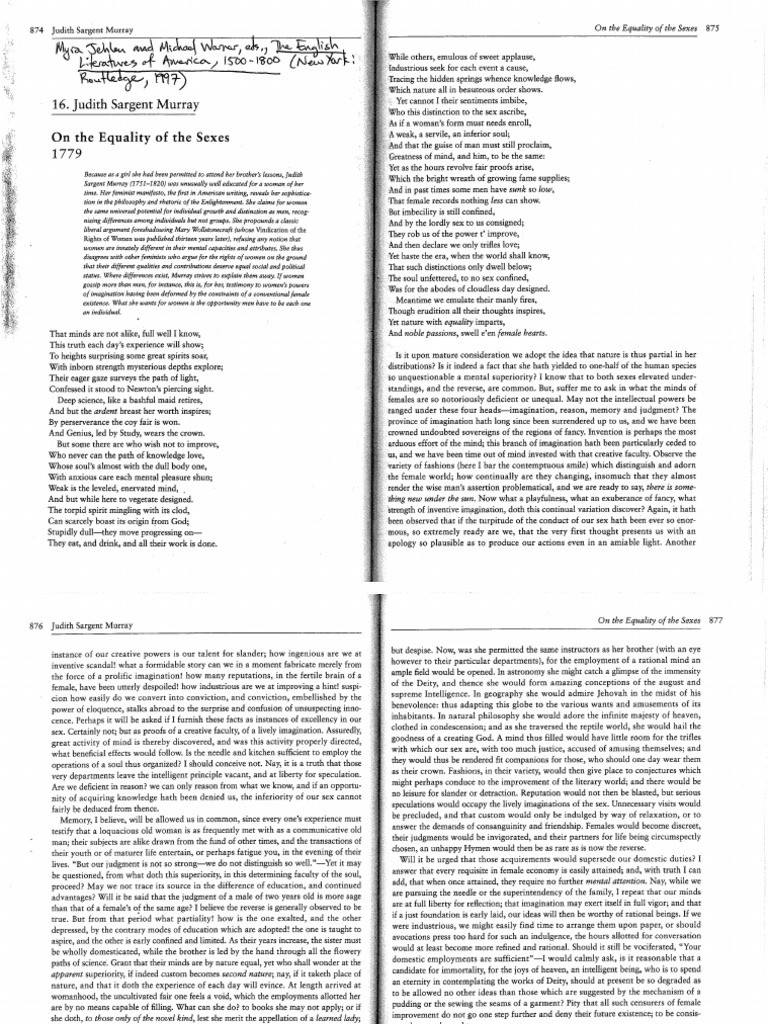The principles espoused in the Bahá’í faith assert the absolute equality of the sexes as a profound and compelling doctrine. This tenet is not merely an aspiration but rather a divine imperative—an essential component of societal harmony and spiritual integrity. Such equality does not preclude differences between the genders; instead, it embraces and celebrates unique attributes while underscoring the inherent worth of all individuals. In this exploration, we will delve into the tenets of this teaching, its historical context, its implications for the modern world, and its broader spiritual significance.
At the heart of Bahá’í teachings lies the radical notion that all humanity is created equal. This foundational principle is akin to the steady pulse of a vibrant ecosystem, where the diverse elements synergistically contribute to the flourishing of life. The Bahá’í view contends that the inherent equality of men and women is essential for the advancement of civilization itself. To comprehend the significance of this belief, one may consider the metaphor of a bird taking flight. Just as a bird requires both wings to soar, society necessitates the dual contributions of both genders for holistic development and progress.
This understanding finds resonance in the writings of Bahá’u’lláh, the founder of the Bahá’í Faith, who enjoins followers to recognize the equal capacities of men and women in all aspects of life. He fiercely criticized societal norms that relegated women to positions of subservience and obscured their potential. Through his teachings, he articulates that denying women their rightful status is tantamount to blinding one eye while attempting to behold the vastness of the cosmos. Such vivid imagery evokes a profound understanding of the folly of gender discrimination.
The implications of gender equality in the Bahá’í worldview extend well beyond theoretical discussions. Practical initiatives aimed at empowering women are crucial in transforming societal structures. Education emerges as a pivotal instrument in this regard. The Bahá’í teachings advocate for equal access to education for both genders, positing that enlightenment derived from knowledge sparks the flame of progress. When women are educated, they become catalysts for change—nurturers of children, contributors to economies, and leaders within their communities. Just as a seed germinates into a robust tree when nurtured in fertile soil, so too do women flourish when provided with the means to cultivate their potential.
This call for educational equity reverberates through Bahá’í communities worldwide, where initiatives are launched specifically to uplift women and girls. Such endeavors not only fulfill ethical and moral imperatives but also yield tangible benefits for entire societies. Empirical evidence substantiates the claim that societies which embrace gender equality experience enhanced economic growth, reduced violence, and improved health outcomes. These phenomena can be likened to the harmonious interplay of colors in a stunning painting; each hue enhances the overall beauty of the artwork, creating a landscape of rich opportunity.
Furthermore, the Bahá’í perspective situates gender equality within the broader framework of unity. The quest for global peace and cooperation is intricately linked to the recognition of the equal rights of all individuals, irrespective of gender. In this global mosaic, every piece—each person—must find its rightful place for the picture of unity to be complete. In essence, empowering women fosters a sense of collaboration that transcends barriers, cultures, and nations. Such solidarity is imperative in addressing global challenges; be it climate change, conflict resolution, or public health crises, the involvement of women is unequivocally vital.
Despite this, resistance to the concept of gender equality persists. Patriarchal structures and ingrained societal norms often perpetuate a status quo that undermines the potential of half of the human population. The Bahá’í response to this entrenched inequality is not one of confrontation but of education, dialogue, and compassionate engagement. Like adept gardeners, Bahá’ís are called to cultivate understanding, uproot misconceptions, and plant the seeds of respect and equity in the hearts of all. This analogy illustrates the nurturing approach that can transform divisive perspectives into a florid tapestry of unity.
It is essential to recognize that achieving absolute equality requires persistent effort and unwavering commitment. The journey towards this divine imperative is akin to ascending a mountain—there are challenges to confront, obstacles to navigate, and moments of doubt to overcome. However, just as the summit offers a panoramic view of the horizon, attaining equality between the sexes unveils unprecedented vistas of opportunity and collective empowerment.
In conclusion, the Bahá’í teachings on the absolute equality of the sexes represent more than an ideological stance; they constitute a divine mandate that seeks to eliminate injustices wrought by gender discrimination. The call for gender equality fosters a deeper moral fabric in society, enhancing the potential for peace and prosperity. As we collectively rise to embrace this imperative, let us remember that the harmony of humanity rests upon the delicate interplay of both masculine and feminine energies—a dance that, when performed with mutual respect and understanding, illuminates the path toward a brighter and more united world.
